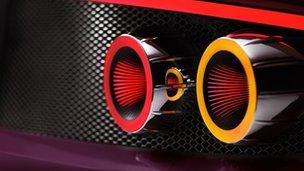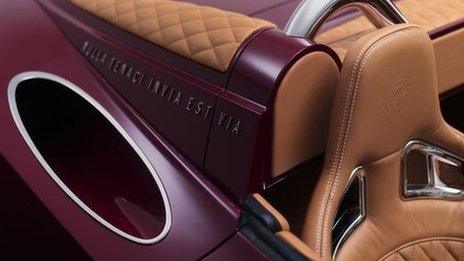Spyker hopes new car will spark revival
- Published
Spyker chief executive Victor Muller unveils the car he hopes will save his firm's fortunes
When Dutch sports car manufacturer Spyker unveiled its latest model at the Quail Motorsports Gathering in California's Pebble Beach last month it was about more than just a car.
The B6 Venator Spyder, a two-seater with rear lights modelled on the jet engines of modern fighter planes, represents Spyker's battle for survival.
Currently the company makes just one type of car - the C8 Aileron - and it produces only one a week, hand built to a customer's precise specifications in its Netherlands-based factory of only 45 people.
This type of customisation doesn't come cheap. The C8 sells for around 200,000 euros (£169,200) and with production coinciding with the 2008 global financial crisis, it's not surprising that demand has been slow.
Its two new models - the B6 Venator Spyder car and the B6 Venator Coupe, launched in Geneva in March - are aimed at changing all of this. Both will be significantly cheaper with the B6 Venator Spyder expected to sell for about £120,000 and the B6 Venator Coupe for £110,000.

The rear lights are modelled on the jet engines of modern fighter planes
"All of a sudden you get into an area where tens of thousands of potential buyers are available," says chief executive Victor Muller. "It's a statement to the market that we have come back with a vengeance and that we're here to stay. It's much more than just a new car. It symbolises the new Spyker."
Mr Muller says the cars will be a "game changer" for Spyker's business model because it will take it from being a niche car manufacturer to a mid-market one.
It plans to ramp up production next year to between 250 and 500 cars a year, up to 10 times the 50 cars it is able to produce currently.
Fight for survival
Just two years ago, the company was close to going under. Its 2010 purchase of Saab - one of Sweden's best-known car brands - failed spectacularly. Less than two years after shelling out $74m (£47.7m) for the brand, Saab went bankrupt, almost taking Spyker down with it.
"It was the biggest setback of my business career. It was like losing a very close relative," says Mr Muller.
Spyker was forced to seek outside help. Eventually it secured a deal with Chinese car manufacturer Youngman, which agreed to invest 10m euros (£8.5m) in Spyker and contribute a cool 25m euros in cash to fund its development of a new sport utility vehicle (SUV).
This came at a price however, with Spyker having to relinquish almost a third of the business (29.9%) to Youngman.
"It's a very simple sacrifice to make that you will give up some of your autonomy in favour of sheer existence," says Mr Muller.
"We wouldn't be here if we didn't have third-party investors. It's as simple as that.
"So it's really not a compromise. I was willing to do anything and everything for Spyker to survive and become a viable business again," says Mr Muller.

Spyker's motto means: "For the tenacious, no road is impassable"
'Hard ride'
The problems of the past two years echo what has been a bumpy history for the company since its revival in 2000. Its financial restructuring in 2012 produced its sole profit in its 13-year history. And its ill-fated ownership of an Formula 1 team in 2006, which Spyker sold on a year later at a massive loss, also almost took the company under.
"It's been a very hard ride but self-inflicted and we made it very hard," says Mr Muller.
The new models mark Spyker's last chance.
"Without it, it's difficult to see how the company could continue to grow or exist with just a few dozen cars here or there," says John Walton, former vice-president of Aston Martin, who joined Spyker as its chief commercial officer last year.
Whether the new cars will succeed in finally turning Spyker into a profitable car maker is still uncertain. Production of both the new models will only start next year.
And as Tim Urquhart, senior analyst at IHS Automotive, says, there is a long way to go before then.
"Spyker still has to find a distributor and dealership in all the major countries including the US, Europe and China," he says.
However, Mr Urquhart is cautiously optimistic. "These kind of cars are always going to be a slightly marginal business. But I think that it's a car that could sell and find a market."
Featured on both cars in small lettering is Spyker's motto - the same one it's had since 1914: "Nulla tenaci invia est via" meaning: "For the tenacious no road is impassable", something Mr Muller will be hoping the company lives up to.
Escape from the Boardroom is a five-part series, starting on 21 September, broadcast on BBC World News on Saturdays at 02:10 and 15:10, and Sundays at 09:10 and 21:10 (all times GMT).